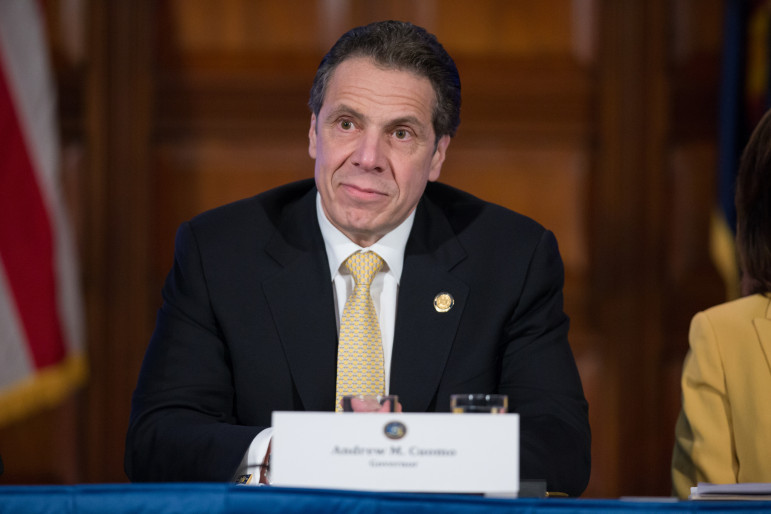
Office of the Governor
Gov. Cuomo's education reforms must include more effort to meet the state's financial obligation to districts, the author argues.
Yes, Governor Cuomo’s recently released report links 178 low-performing schools to the names of the state legislators whose districts they fall in. And yes, the district I represent – the 33rd Senate District in the Bronx – has more than 10 percent of the low-performing schools in the city.
But let’s be clear: the debate over education policy is not about me and will not be resolved by pitting one elected official against another. Although it makes for a good headline, this issue is really about the children that are not receiving the educational resources they need and deserve.
I know the schools on the governor’s list. I have visited 7 of the 12 identified in the report. I have talked to the parents, principals and teachers who have to struggle each day to give their kids the resources they need in order to succeed.
With all due respect to the governor, his report excludes an important context: a nuanced analysis of the social factors that impact a student’s education and a statewide conversation about the funding children need to move beyond existing barriers.
While state funding for New York City schools has increased by 13 percent over the last three years, this funding has not been allocated towards addressing the root of the problem – the social factors that impede academic progress. Even worse, the state has actively impeded the potential progress of struggling schools by withholding $5.5 billion, money that these schools are entitled to receive as a result of the Campaign for Fiscal Equity settlement.
While it is easy to pin the educational disparities of these failing schools on its teachers, extensive research shows that home and neighborhood environments are in many ways more important than what happens in the school.
Take the 12 low-performing schools in my district: they educate children who come from the most poverty-stricken communities in New York State. The average rate of students who receive free or reduced priced lunch is 89.64 percent at these schools, while the average across the city is 76 percent. On average, 15 percent of students at these schools are living in temporary housing.
The simple reality is that if a child is hungry or sleeping in a shelter, they are not as able to focus on school work and are less likely to succeed.
Yet, while students and teachers struggle, the state fails to meet its obligations. The State owes the schools in my district alone over $131 million under the Campaign for Fiscal Equity settlement, $26,246,000 of which is supposed to go to nine of the schools that appear on the Governor’s report. This funding could have gone to providing much needed resources, such as tutoring, extracurricular activities, supplies, and social service programs that could have had a lasting impact on our children’s education.
Pointing out these truths does not mean we should adopt low expectations, or excuse teachers that are not doing their jobs. But it does mean that we must search for a comprehensive solution that addresses all facets of the problem rather than simply tying the success of a child and the career of a teacher to standardized tests. Not only is that wrong – it’s simply not working.
This year, under the governor’s stewardship, we have the opportunity to make lasting changes to the entire state’s educational system. We can make a difference in the future of thousands of our children, but only if we commit to focusing on the obstacles that are standing in their way and providing the funding they need, rather than playing politics and dividing a community committed to educating our kids.
State Sen. Gustavo Rivera (D,WF) represents the 33rd district in the Bronx.
City Limits coverage of the Bronx is supported by the New York Community Trust.









3 thoughts on “Pol: Schools Need State Help, Not Sensational Headlines”
Dear Senator Rivera,
Thank you for standing up for the schools that Governor Cuomo has put on his list of “failing schools.” If the governor were genuinely interested in the well-being of the students who attend these schools, as he claims, he would fund the schools and give support to their efforts.
To close a school is to kill a community. We watched the horrible and destructive process of school closures under Mayor Bloomberg, and we are now experiencing the dread all over again. As we read the governor’s plan it feels as if we are overhearing a murder being plotted and we wonder if we will be able to stop it.
Of the 90 New York City schools the governor is targeting, 44 of them are in the Bronx. We must stop the governor and save these schools, along with the others across New York City and New York State, and your letter is a start. Thank you for telling it like it is.
Jane Maisel
Member of NYC Opt Out
Pingback: » Teachout/Wu Email March 15, 2015 Band of Rebels
Pingback: The fight for public schools in NY gets more tense every day. Here's where we are... | LIpolitics.com : Long Island's Political Network